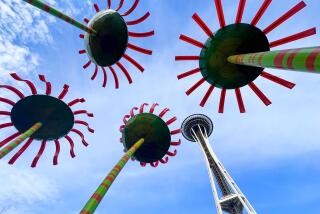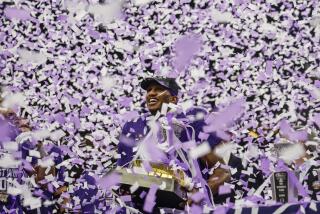THE PACIFIC SUMMIT : Host City : Seattle: Rising in the West : Its ties with Asia could make it synonymous with Pacific Rim trade
SEATTLE — When Michio Takechi, general manager of Japanese trading giant Mitsui & Co.’s Northwest headquarters, praises Seattle, you would think that he was working for the local chamber of commerce.
He likes his view of Lake Washington; he finds Seattleites more courteous than residents of Los Angeles or New York, and he is impressed by the region’s growing strengths in software and high technology. “With L.A.’s rash of riots and fires,” he says, “many Japanese are escaping from that area, and one destination seems to be the Pacific Northwest.”
Seattle believes that other Asians, given the chance, will agree with Takechi’s assessment of the city. As 2,000 journalists and 1,000 delegates converge on this city this week from around the Pacific Rim to attend the annual Asia-Pacific Economic Cooperation forum, Seattle will be able to make the case that it ought to be America’s Gateway to the Pacific--or at least the “Geneva of the Pacific.”
The city has already emerged from relative obscurity in Asia as business and government leaders talk about the upcoming “Seattle meeting” of APEC to be followed by the “Seattle Leaders”’ conference, where the heads of the Asian states, in their first meeting ever, are expected to conclude with a “Seattle Declaration.”
“This is a defining moment for Seattle and for the Pacific Northwest,” Seattle Mayor Norman Rice said in an interview. “As a host, Seattle has the opportunity to become synonymous with Pacific Rim trade for the next century.”
Officials hope that the increased exposure will attract business away from Long Beach and to the Port of Seattle, and lure investors to the Northwest who might otherwise have invested in Los Angeles.
Seattle could also raise its profile at home.
Clinton is expected to point to this city as a living model of the benefits of free trade. One in five jobs in Seattle is tied to trade. And four-fifths of the trade is with the rapidly growing nations of the Pacific Rim.
Until last year, when imports outpaced exports, Washington state was one of a handful of states with an overall trade surplus.
The state exported $33.5 billion worth of products last year, two-thirds of which went to markets in Asia. The Boeing Co.’s aircraft exports to Asia alone were worth $5 billion last year.
Seattle is not only physically the closest major American city to Asia--a day closer to Tokyo by ship than Los Angeles--it is also emotionally and culturally closer to Asia than most American cities.
“By an accident of history, we don’t have the economy of the Rust Belt,” explains Robert Kapp, the executive director of the Washington International Trade Council, who was instrumental in bringing APEC to Seattle.
Unlike the auto workers of Michigan or the steelworkers of Pittsburgh, Seattleites have no reason to hold a grudge against Asia’s rising economies.
Seattle’s Asian ties go back a long way. A Japanese fisherman blown off course on his way to Tokyo in 1834 washed ashore on the Olympic Peninsula, was captured by Indians and was sold as a slave to the Hudson’s Bay Co.
When Chinese and Japanese began immigrating in large numbers in the early 1920s, they faced hostility. But when Tokyo burned down after the great earthquake of 1924, much of the timber to rebuild the city came from Seattle. And Washington’s Japan-America Society, a strong promoter of positive bilateral ties, dates to 1923 and now has a budget second only to the New York chapter’s.
The University of Washington had the nation’s first Korean studies department and still houses one of the nation’s largest collections of Asia specialists.
Today, joined by a flood of new immigrants from Southeast Asia, Asians make up 11% of the city’s population, its largest minority, and more than a fifth of its school population. There are more Asian elected officials in Washington than in any state except Hawaii.
Asian business people who move here quickly feel at home.
Seattle has a supermarket that has a greater choice of Japanese food products than most Japanese supermarkets. Nearby Bellevue has a Japanese Saturday school with 700 students.
For all Seattle’s Asian connections, they pale in comparison to those of Los Angeles, which boasts the largest population of Koreans outside of Korea and by far the largest portion of Japan’s overseas investments.
Wealthy Indonesian and Malaysian families with hundreds of millions of dollars to invest in America recently chose Los Angeles as their base. While major companies such as Toshiba, Mazda and Hyundai are headquartered in the greater Los Angeles area, Nintendo is the only major Asian company with a Seattle base.
But Seattle has a major political advantage. The importance of trade to Seattle and Washington has meant that the state’s Congress members have been unabashed free traders. This has made them the darlings of Asian government lobbyists fighting what they see as a growing protectionist trend in America.
Washington state’s consistent free trade position in Congress has also been “very important” in the decision of a growing number of Asian companies to invest in Seattle, Gov. Mike Lowry told The Times.
When Sony bought Columbia, there was a roar of protest about the Japanese buying a national icon. Compare that to the reaction in Seattle when Japanese video-game maker Nintendo purchased a majority share in the Mariners, Seattle’s beloved baseball team. Everybody from civic leaders to sports commentators came to Nintendo’s defense.
Seattle is mounting a full court press to show itself at its best this week. Boeing Commercial Airplane Group President Dean Thornton is chairman of the APEC Host Committee, while the company’s government affairs officer is heading a staff of 60 volunteers preparing for the events. McCaw Cellular is providing $175,000 worth of equipment, including 300 cellular phones for visitors.
Visitors will be given baskets of local produce, including Washington wines and apples. And they will not have to look far for evidence of Seattle’s involvement in trade--Chinese and Korean ships sail almost daily in full view of most downtown hotels.
With the bulk of the APEC meetings closed to the press, locals expect the thousands of visiting journalists to have plenty of time to send out feature stories about Seattle.
The reporters will receive a 50-page introduction to the region and be invited on tours of major Seattle sites, including the massive factories where Boeing assembles its jumbo planes.
Still, it will not be an easy sales job for a town that likes to call itself the Emerald City.
This week, according to weather charts, is typically among Seattle’s grayest and rainiest.
“Maybe Clinton won’t get his place in the sun,” chuckles Rice, “but he will have his place in history.”
After choosing Seattle as the site for APEC, State Department officials were surprised to discover that they had to compete for rooms not only with 5,000 card players shuffling in for the American Contract Bridge League’s annual fall tournament, but also with about 10,000 fans descending on the city for the state’s most important football game of the year--the “Apple Cup” rivalry between the University of Washington and Washington State.
South Korean officials complained when President Kim Young Sam was not offered the $2,000-a-night presidential suite at the Sheraton Hotel because it was already reserved for the Bridge League’s chairwoman, Barbara Nudelman. The likely compromise: Nudelman will get her $2,000-a-night room, while an unhappy Kim gets the “governor’s suite.”
Delegates could also find themselves facing rallies critical of their policies at home.
Last month, several dozen activist groups, including those demanding protection of rain forests and independence for Tibet, met in what was called an effort to draw up a “battle plan” for what they hope will be “the biggest rally in U.S. history.”
And many Asian visitors accustomed to the hustle and bustle of Asia’s mighty cities, such as Hong Kong and Tokyo, could be disappointed with a city that has few shopping attractions and little night life.
Then there is the question of whether APEC produces any substantial results. Says Rice, ever the optimist: “Even if the (visitors) are disenchanted by President Clinton, they could still be enchanted by Seattle.”
More to Read
Sign up for Essential California
The most important California stories and recommendations in your inbox every morning.
You may occasionally receive promotional content from the Los Angeles Times.










